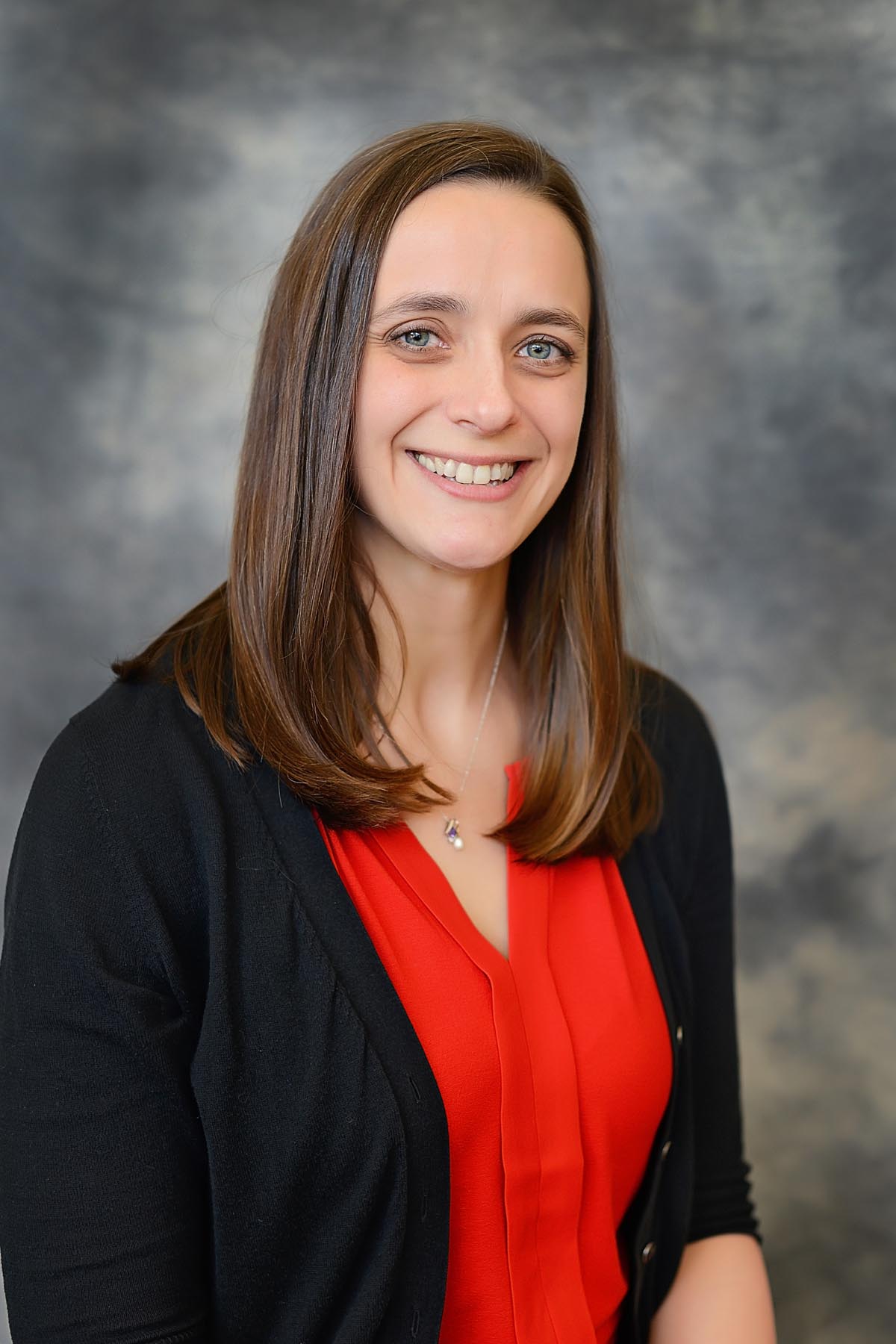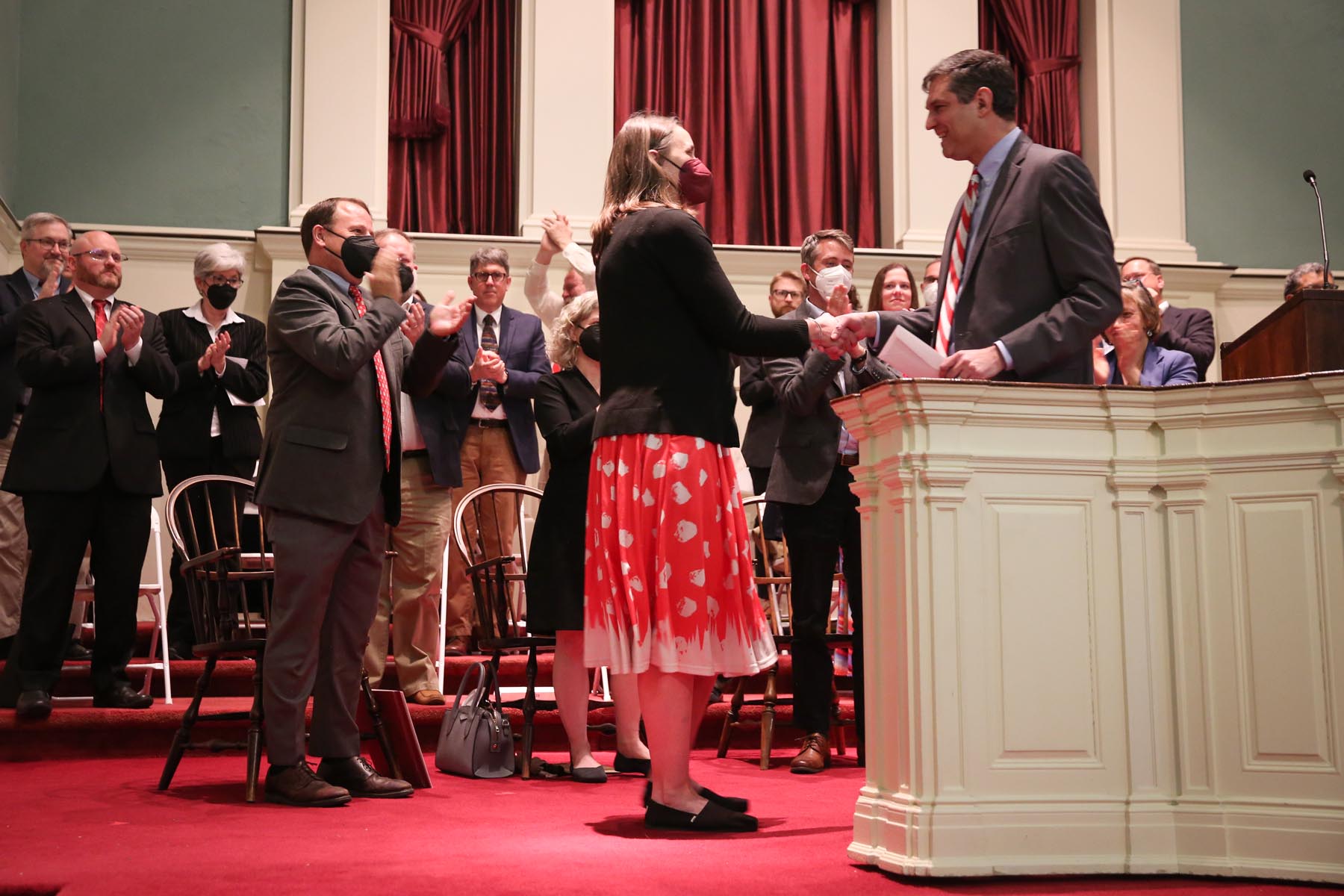Moments before Dean of the College Todd McDorman announced the 2022 winner of the McLain-McTurnan-Arnold Excellence in Teaching Award, Laura Wysocki recalls looking around in admiration at her colleagues who surrounded her on stage during the College’s annual Awards Chapel.
These faculty members — along with many others who came before her — have served as mentors to Wysocki over the last 11 years of her Wabash career.

“It’s not my turn yet,” Wysocki told herself.
Many of Wysocki’s colleagues who sat with her on the Pioneer Chapel stage might have disagreed. McDorman put the issue to rest by naming her as the 2022 winner of the College’s highest teaching honor.
The McLain-McTurnan-Arnold Excellence in Teaching Award honors the memories of Reid H. McLain ’27, Clair McTurnan 1910, and Kent Arnold ’29, and has been given annually to a member of the faculty who has distinguished themselves by innovative and engaging teaching since 1965.
“The dedication as a teacher shown by this year's winner serves as a model for all of us,” McDorman began his address in recognizing the award recipient.
“This year's recipient of the M-M-A teaching award may, by some majors, have the hardest job of all our faculty, because this person was hired to teach a subject that routinely tops national lists of the most difficult college courses, and inspires dread in the hearts of science majors all over the country,” McDorman continued. “This could have been a recipe for disaster, but from this person's first days on campus, they have been known for going the extra mile and for infusing their classrooms with a deep and sincere passion for even the most challenging subjects.”
As Wysocki made her way through the crowd to receive her honor from McDorman, cheers erupted throughout the Chapel. Faculty members gave hugs and high-fives, and rows of students gave a standing ovation in celebration of the honor.
When Wysocki looked down from the stage, she saw students she taught in courses like organic chemistry pumping their fists in excitement and cheering as soon as they connected from McDorman’s description that Wysocki was this year’s winner.
“That brought it home in a really different way,” Wysocki said. “It felt like a shared experience, and that was really joyous for me.
“What I heard reflected in the words that Dean McDorman was saying were those other faculty members who I consider mentors, and things others encouraged me to do in my teaching. I heard the student accomplishments and the things they really allow me to achieve while I teach,” Wysocki said. “This is a shared award, and that’s how I see myself as a teacher.”

Wysocki joined the Wabash faculty in 2011 after completing postdoctoral research at Howard Hughes Medical Institute’s Janelia Research Campus; and a Ph.D. in organic chemistry from the University of Wisconsin–Madison. She graduated magna cum laude with honors in chemistry and integrated science, earning a bachelor’s degree in 2003 from Northwestern University.
Wysocki is a proud Wisconsin native who specializes in organic chemistry. She focuses on the synthesis and study of fluorescent dye derivatives that can be used as sensors or enzyme substrates.
She has always been inspired by the interdisciplinary nature of science and enjoys working with undergraduates in her laboratory exploring new ideas. She has recently taught special topics courses in natural product synthesis, the chemistry of the pharmaceutical industry, and dye chemistry.
Wysocki’s favorite class to teach at Wabash is organic chemistry. Not only is she passionate about the topic, but she finds joy in watching her students grow as scholars from the first day of class to the very last.
Students come in knowing that the course is going to be hard, and Wysocki said it’s her job to teach them that they can do and accomplish hard things.
“When they first start the class, most students, whether they want to admit it or not, are intimidated by what’s to come,” Wysocki said. “Every year it’s a shock for students to come to class and have words that they’ve never heard of before thrown at them, and I have to redefine those in a way that is understandable.
“It’s all part of the journey, and it’s that journey that I love the most about being a teacher,” she said. “The journey they go on from that first day, to the end of the year-long sequence is so dramatic in the transformation in the vocabulary they use, in the way they approach problems, and in all those skills and techniques that they learn. I get to watch a confidence build, and when I talk to students at the end of the year and they are able to reflect on how far they’ve come, that to me is a win. That’s really rewarding.”
Wysocki has earned numerous accolades over the years as a scientistic and teacher. Some of those include being the first to hold the Edwin J. Peck/David A. Phillips Professorship in Chemistry, a chair endowed by Phillips following his passing; being named Wabash’s McLain-McTurnan-Arnold Research Scholar; and earning the Outstanding Teaching Assistant Award from University of Wisconsin–Madison.
In 2020, Wysocki, along with Associate Professor of Rhetoric Sara Drury, was awarded a nearly $600,000 grant from the National Science Foundation (NSF) to study the impacts of deliberation on undergraduate STEM education.
One of Wysocki’s proudest accomplishments is being the mother to her four-year-old daughter, Abigail, who was able to make it to Awards Chapel to see her mother receive the McLain-McTurnan-Arnold Excellence in Teaching Award.
“She was so excited and proud of me,” Wysocki said. “To see that look on her face was really, really meaningful.”
Wysocki explained that she’s been able to bring her daughter along with her on parts of her own journey as a teacher at Wabash, and through exposure to the classroom and students, Abigail has learned that the work her mother does every day is important.
“I am so lucky that the Wabash community has invested in me as a person, and that includes my family,” Wysocki said. “I really benefit from the student investment in my life and their openness to my family, in a lot of ways.”